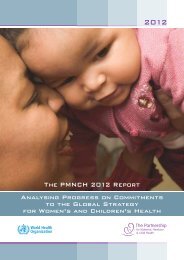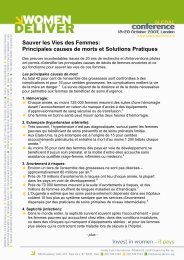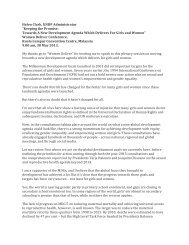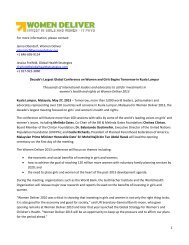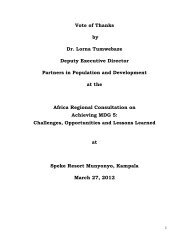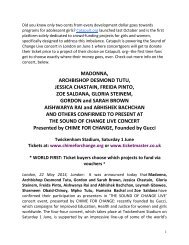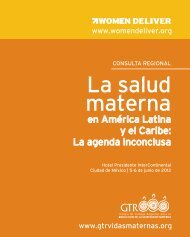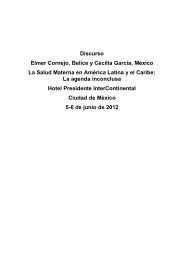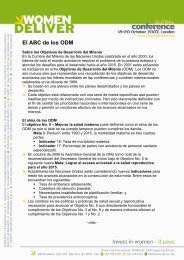Cultural attitudes and expectations regardingvirginity, marriage and family roles remain rigidin many places, reinforced by anxieties aboutfemale sexuality, power and independence andthe very real dangers girls may face (Greeneand Merrick, n.d.). As more girls stay in schoolfor longer, they are statistically more likely tomature sexually while they are enrolled; theyface risks that few schools address adequately,including sexual violence, exposure to sexuallytransmitted infections and HIV, early pregnancyand childbearing, and unsafe abortion (Lloyd2009). Of course not all <strong>of</strong> these risks are new,or occur just at school; out-<strong>of</strong>-school girls alsomarry, and continue to have children as teens ingreat number. What is new is the greater possibility<strong>of</strong> friction between the parts <strong>of</strong> girls’ rolesthat remain stable (domestic chores, expectationsabout virginity, the management <strong>of</strong> theirsexuality, and aspirations for marriage) and thosethat are changing (schooling, exposure to peers,greater mobility in some cases).Unsafe abortion is “a procedure for terminating anunintended pregnancy that is carried out either by a personlacking the necessary skills or in an environment that doesnot conform to the minimal medical standards, or both.”— <strong>World</strong> Health Organization (1992).An analysis in five African countries <strong>of</strong> theexperience <strong>of</strong> 12-to-19 year-olds who were inschool at age 12 shows that girls are less likelythan boys at every age to continue in primaryor secondary school, and less likely than boysto make the transition from primary to secondaryschool (Biddlecom et al., 2008). Girls aremuch more vulnerable to dropping out oncethey are sexually mature and once they experiencepremarital sex; early pregnancy is evenmore disastrous for girls. Some recent researchsuggests that pregnancy and early marriage aremore likely consequences rather than causes<strong>of</strong> girls failing to complete their secondaryeducation (Biddlecom et al., 2008; Lloyd andMensch, 2008).Redefining what it means to be a“real man”Like women and girls, men and boys feel socialpressures to adopt rigid ideals about how theyshould behave, feel, and interact to be consideredreal men. These ideals are learned, nota result <strong>of</strong> simply their sex (Connell, 1987;Connell, 1998). When given the opportunity tocritically reflect on these ideals, men and boyscan <strong>of</strong>ten describe the pressures they feel to bereal men—a term usually ascribed to takingrisks, enduring pain, being tough, being aprovider, and having multiple sex partners(Flood, 2007).Real men usually refers to hegemonic masculinity—theprevailing measure <strong>of</strong> masculinityby which men assess themselves and others.Dominant concepts <strong>of</strong> masculinity are complexand different across societies, influenced by severalfactors including culture, race, social class,and sexuality (Kimmel, 2000). For example, agroup with one version <strong>of</strong> masculinity withina social class or ethnic group may exert greaterpower over another, just as heterosexual masculinityis <strong>of</strong>ten dominant over homosexualand bisexual masculinity (Marsiglio, 1998). Inmany societies, hegemonic masculinity is associatedwith heterosexuality, marriage, authority,pr<strong>of</strong>essional success, ethnic dominance, and/or physical toughness (Barker, Ricardo andNascimento, 2007).Men and boys who deviate from dominantmale norms in their attitudes and behaviours aresusceptible to ridicule and criticism (Barker and44 CHAPTER 3: CHALLENGES IN EXTENDING ACCESS TO EVERYONE
Ricardo, 2005). Moreover, young and adult menwho adhere to these traditional views <strong>of</strong> manhoodare more likely to engage in riskier sexualpractices (Sonenstein, ed, 2000). Results fromthe Gender Equitable Men Scale have foundthat men who adhere to more rigid views aboutmasculinity are more likely to hold attitudes orpractice behaviours that compromise their sexualhealth and their partners’ health (Pulerwitz andBarker, 2008).Not all boys and men identify with dominantversions <strong>of</strong> masculinity within theircommunities. For example, young men <strong>of</strong>higher socioeconomic status <strong>of</strong>ten hold morepower and access to goods and opportunitiesthan young men <strong>of</strong> lower socioeconomicclasses (Barker, 2005). The evolution <strong>of</strong> whothey are within their peer groups, families, andcommunities is a dynamic process that changesover time (Connell, 1994). Men’s attitudes andexperiences, particularly the conclusions theydraw about what is socially acceptable behaviour,have implications for men’s and boys’willingness to access family planning servicesand to be active participants in planningfamilies with their partners.A global review conducted by the <strong>World</strong>Health Organization found that culturally dominantforms <strong>of</strong> masculinity, which <strong>of</strong>ten urge mento practice strict emotional control and cultivatea sense <strong>of</strong> invulnerability, serve as barriers tohealth—and health-seeking behaviour: they discouragesome men and boys from visiting healthfacilities or from supporting their partners’ health(Barker, Ricardo and Nascimento, 2007).Men <strong>of</strong>ten have no opportunity to questionthese male norms or to reflect on how theirviews <strong>of</strong> manhood affect their health and theirpartner’s health. However, tailored programmeshave demonstrated that young and adult mencan adopt equitable attitudes and behaviours—attitudes associated with better sexual andreproductive health outcomes (InternationalCenter for Research on Women and Promundo,2010; UN Women, 2008).Prevailing attitudes and norms aboutsex impede access for young people,unmarried people <strong>of</strong> all ages, men andboys and marginalized groupsSocial and cultural norms dictate who, when,with whom, and for what purpose women andmen should have sex. Sexual activity is widelyviewed as acceptable only when the “right”people engage in it under the “right” conditions.The perspectives <strong>of</strong> excluded groups are notclosely reflected in the design, implementation,and evaluation <strong>of</strong> family planning policies andprogrammes. The impediments to their accesstYoung men in Cairo'sTahrir Square.©<strong>UNFPA</strong>/Matthew CasselTHE STATE OF WORLD POPULATION <strong>2012</strong>45
- Page 6 and 7: OverviewOne hundred seventy-nine go
- Page 8 and 9: The report is structured to answer
- Page 10 and 11: viiiCHAPTER 1: THE RIGHT TO FAMILY
- Page 12 and 13: “All human beings are born free a
- Page 14 and 15: Treaties, conventions and agreement
- Page 16 and 17: Health: a social and economic right
- Page 18: “Everyone has the right to educat
- Page 21 and 22: designing and delivering accessible
- Page 23 and 24: use, and reduces unintended pregnan
- Page 26 and 27: 16 CHAPTER 2: ANALYSING DATA AND TR
- Page 28 and 29: Change in Age-Specific Fertility Ra
- Page 30 and 31: Sexuality, sexual and gender stereo
- Page 32 and 33: not necessarily associated with a d
- Page 34 and 35: METHOD EFFECTIVENESSMethod, rankedf
- Page 36 and 37: tCouple visiting a ruralfamily plan
- Page 38: Demand and supply over time5 per ce
- Page 41 and 42: contribute to high unmet need (Sing
- Page 43 and 44: abortions in the region lead to mor
- Page 45 and 46: (as stated in the Convention on the
- Page 47 and 48: arriers prevent individuals from ac
- Page 49 and 50: CHAPTERTHREEChallenges in extending
- Page 51 and 52: sources of sexual and reproductive
- Page 53: messages were delivered via a numbe
- Page 58 and 59: per cent in Guatemala. Across all c
- Page 60 and 61: tTeenager inMadagascar listens toa
- Page 62 and 63: Consensual unions account for an in
- Page 64 and 65: when. The proportion of never-marri
- Page 66 and 67: 63 per cent to 93 per cent of young
- Page 68 and 69: Family planning in humanitariansett
- Page 71 and 72: Studies suggest that HIV may have a
- Page 73 and 74: with a public health challenge (Wor
- Page 75 and 76: State-run family planning programme
- Page 77 and 78: people in mobile, temporary, and re
- Page 79 and 80: systems and civic participation to
- Page 81 and 82: CHAPTERFOURThe social and economici
- Page 83 and 84: tCommunityeducation inCaracas, Vene
- Page 85 and 86: Estimates of Total Fertility2010-20
- Page 87 and 88: children, and healthier women also
- Page 89 and 90: empirical evidence supporting this
- Page 92 and 93: tRicardo and Sarain Mexico City say
- Page 94 and 95: to secure the future population’s
- Page 96 and 97: 86 CHAPTER 5: THE COSTS AND SAVINGS
- Page 98 and 99: Unintended Pregnancies and outcomes
- Page 100 and 101: tDonor Commitmentspanel at the Lond
- Page 102 and 103: UNFPA supports the Health for All c
- Page 104 and 105:
tDr. BabatundeOsotimehin, Executive
- Page 106 and 107:
96 CHAPTER 6: MAKING THE RIGHT TO F
- Page 108 and 109:
When individuals are able to exerci
- Page 110 and 111:
Family planning programmes must ref
- Page 112 and 113:
Family planning programmes reinforc
- Page 114:
tPresident of NigeriaGoodluck Jonat
- Page 117 and 118:
Monitoring Monitoring ICPD ICPD Goa
- Page 119 and 120:
Monitoring Monitoring ICPD ICPD Goa
- Page 121 and 122:
Monitoring Monitoring ICPD ICPD Goa
- Page 123 and 124:
Monitoring ICPD Goals Demographic -
- Page 125 and 126:
Monitoring ICPD Goals - Selected In
- Page 127 and 128:
BibliographyAbbasi-Shavazi, Mohamma
- Page 129 and 130:
Monitoring ICPD Goals - Selected In
- Page 131 and 132:
Monitoring ICPD Goals - Selected In
- Page 133 and 134:
Monitoring ICPD Goals - Selected In
- Page 135 and 136:
Monitoring ICPD Goals - Selected In
- Page 137 and 138:
Monitoring ICPD Goals - Selected In
- Page 140:
Delivering a world where every preg




